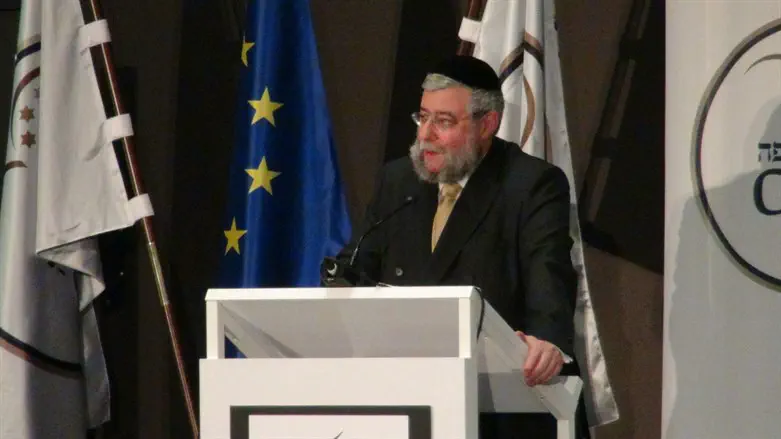
As the head of a large European rabbinical group, Pinchas Goldschmidt regularly travels in and out of Moscow, where he has worked since 1993 as the city’s chief rabbi.
But when he left most recently, two weeks after Russia invaded neighboring Ukraine, he did so without a firm plan to return. And now he is officially working in exile after coming under pressure by Russian authorities to support the war, according to his daughter-in-law.
“Can finally share that my in-laws, Moscow Chief Rabbi @PinchasRabbi & Rebbetzin Dara Goldschmidt, have been put under pressure by authorities to publicly support the ‘special operation’ in Ukraine — and refused,” Avital Chizhik-Goldschmidt tweeted on Tuesday.
Chizik-Goldschmidt, a journalist who lives in New York City, shared a report from the French newspaper Le Figaro that detailed her father-in-law’s experience, which included a fundraising stint in Western Europe followed by a visit with his own father in Israel, where he remains today.
Contacted by the Jewish Telegraphic Agency, Goldschmidt declined to comment or to answer questions about whether he believes that he will return to Russia, where he was reelected as the leader of the Moscow Choral Synagogue on Tuesday.
Goldschmidt has not been a vocal critic of the war, though Le Figaro reported that he was sufficiently concerned about it that he reached out to rabbis in neighboring Moldova in mid-February, days before Russia invaded Ukraine, to warn of a potential flood of refugees.
Other top rabbis in Russia, including the country’s chief rabbi, Berel Lazar, have stayed in the country even after criticizing the war.
But Goldschmidt’s status in Russia has already been shaken by politics in the past.
In 2005, Goldschmidt, who has had a presence in Moscow since 1989, was suddenly denied entry into the country. It took several weeks before he was allowed back in. Authorities gave no official explanation as to the denial of entry, but some officials made unspecified references to “national security issues.”
Goldschmidt has declined to comment on it, but the affair coincided with a power struggle that ended with Lazar and his Chabad-affiliated rabbis dominating the landscape of Russian Jewish institutional life.
Goldschmidt, a Swiss-born rabbi who is not affiliated with Chabad, was eventually allowed to enter Moscow, but the trajectory of his career increasingly centered on Western Europe. He has served as the head of the Conference of European Rabbis since 2011.
